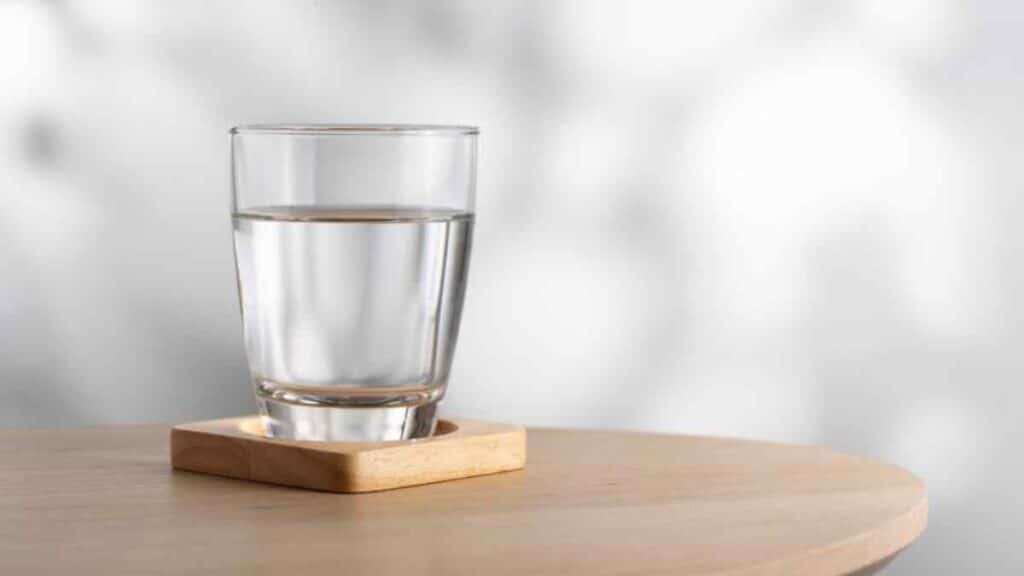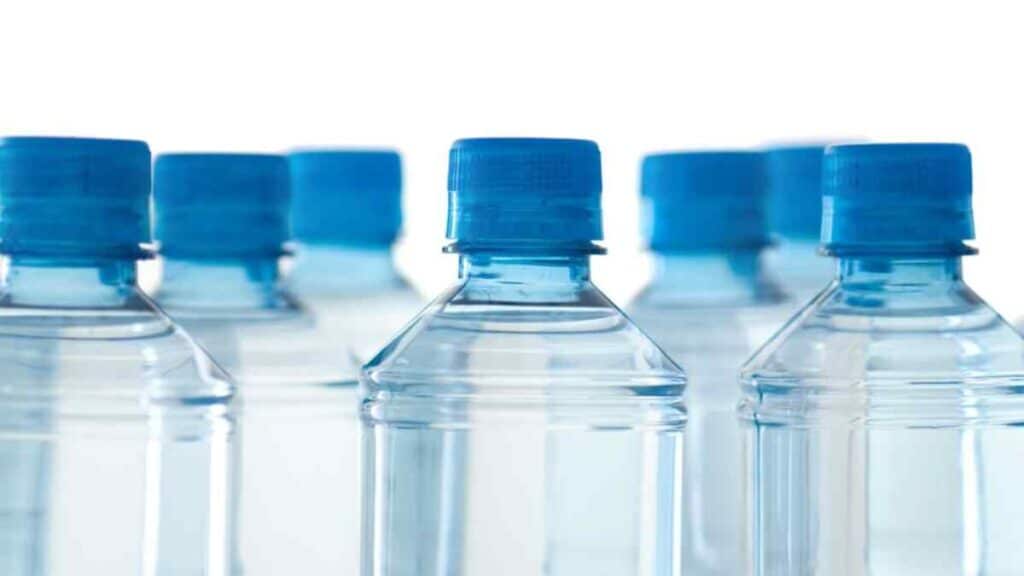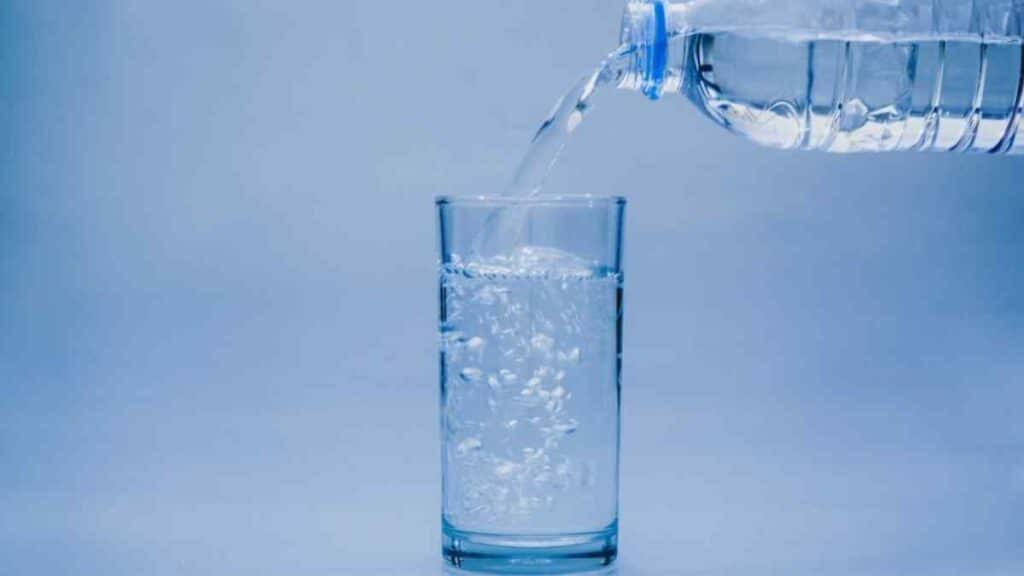If you’re a parent, one of the biggest things on your mind is your child’s health and safety. When it comes to their diet and drinking habits, this means making sure that everything they ingest is safe for them.
Many parents are concerned about what kind of effect tap water will have on their baby’s digestive system and rightly so! Because of these concerns, many parents turn to bottled water as an alternative to their baby’s formula bottles and sippy cups.
However, there are a lot of different types of bottled water out there. In this article, we’ll closely examine what’s safe and what isn’t when using bottled water as nursery water.

Hydration of Babies: Why Is It Crucial?
The hydration of babies is crucial for their development, as well as their health. It’s no secret that babies are born with a very high water content in their bodies. That’s why they tend to have a lot of water weight and need so many diapers to change. But that high water content also comes with some risks.
If your baby isn’t getting enough fluids, they can become dehydrated and experience some serious health problems. Dehydration can lead to seizures, brain damage, and even death in extreme cases. And it happens more often than you might think!
Water also helps babies grow because it carries oxygen through the body. It helps keep the kidneys working properly so that waste products can be removed from the body efficiently. The fact is that babies need more water than adults do because they are still growing so fast and producing waste products at a faster rate.
That’s why it’s so important for you to ensure your little one is hydrated throughout the day and ensure that the bottled water quality is safe.
Is Bottled Water the Same as Regular Water?
Bottled water is a convenience that many people rely on to get hydration. But is it the same as regular water? The short answer isNO.
The main difference between bottled and regular water is that bottled water is usually filtered, purified, and packaged in plastic bottles. In contrast, regular water can be found in many forms, including tap, stream, or spring water.
Bottled Water
Bottled water is packaged drinking water that comes from any number of sources, including municipal water supply or well water, or it can be purified using reverse osmosis and other methods. Many people prefer bottled water because they believe it’s safer than tap water (and they’re right).
However, while many bottled water brands are treated to be safe to drink without further purification, they often don’t have the same chemical makeup as untreated tap or well water.
Bottled water is regulated by the Food and Drug Administration (FDA) and, by law, must meet all federal health standards for drinking water. They must also pass state-level requirements to be sold within any given state.

The Safety Of Bottled Water For Babies
As we previously discussed the different types of water for babies, including tap water, purified water, and distilled water, it’s essential to delve deeper into the safety of bottled water for babies. In this column, we will discuss the precautions that parents should take when using bottled water for babies, whether it’s for drinking or preparing infant formula.
Bottled water, a convenient and widely available option, comes in various forms, such as spring water, purified water, and distilled water. When choosing bottled water for your baby, it’s crucial to consider its source, mineral content, and fluoride levels.
While most bottled water is considered safe for babies to drink, it’s important to ensure that the brand you choose meets specific safety standards. Baby bottled water, also known as nursery water, is specially designed for infants, with low levels of fluoride and other impurities. When preparing infant formula or offering drinking water to your baby, opting for nursery water can be a wise choice.
For parents who prefer using purified bottled water for their babies, it’s vital to check the purification process employed by the brand. Look for water that has undergone a thorough purification process, such as reverse osmosis or distillation, to ensure that it’s free from harmful contaminants.

Spring water, another popular choice for bottled water, is sourced from natural springs and typically has a balanced mineral content. However, it’s essential to be cautious when using spring water for babies, as the mineral and fluoride levels may vary depending on the source. Always opt for low-fluoride spring water when choosing this type of bottled water for your baby.
One concern when using bottled water for babies is the potential for the presence of microplastics or other contaminants leaching from the plastic bottle. To minimize this risk, store bottled water in a cool, dark place, away from direct sunlight or heat sources. Additionally, avoid using plastic bottles that show signs of wear, such as cracks or cloudiness, as they may release harmful chemicals into the water.
When offering drinking water to your baby, it’s best to consult with your pediatrician to determine the appropriate age and amount. In general, babies under six months old should not drink bottled water, as their primary source of hydration should come from breast milk or infant formula. As your baby grows and starts consuming solid foods, your pediatrician can provide guidance on when and how much water your baby can drink.
Types of Bottled Water
There are many different types of bottled water, and each has its unique characteristics. Here are the most common types:
Mineral Bottled Water
Mineral water is a type of bottled water that comes from a natural spring. It contains beneficial minerals such as calcium, magnesium, sodium, potassium, iron, copper, zinc, and manganese. It also has trace elements like mineral salts, boron, and strontium. The amount of minerals in the water varies greatly and can be anywhere from 10 to over 300 parts per million (ppm).
While mineral water is safe for adults to drink, it’s not recommended water for powdered infant formula. The problem with mineral water is that some of these minerals can be toxic at high levels when ingested by an infant or young child. If you’re thinking about giving your baby mineral water, talk to your doctor first.
Distilled Bottled Water
Distilled water is the purest form of water supply on Earth. It’s purified through a process that evaporates impurities out of the water, leaving behind only the purest form. That’s why it’s safe to drink, and when it comes to water for baby formula, this makes it a great choice.
Purified Bottled Water
Purified bottled water is treated and purified to remove any contaminants, such as minerals or chemicals. Purifying bottled water is similar to the process used to purify tap water.
First, the water is filtered using various methods, including carbon filtration and reverse osmosis. Then, the water is disinfected using chlorine dioxide gas or ultraviolet light. Finally, it’s tested for purity before being bottled and sold.
Purified water is safe to mix with baby formula because it has already been treated to remove impurities that could harm your baby’s health.
Fluoridated Bottled Water
Fluoridated bottled water contains fluoride, a chemical used to prevent tooth decay. However, when too much fluoride is ingested, it can cause health problems such as dental fluorosis. It can lead to faint white lines in the baby’s developing teeth and may cause enamel damage.
In addition to this, there are other concerns with fluoridated water. The most common problem with these types of bottles is the quality of the water itself. Fluoridated bottled water often taps water that has been filtered and then sold for profit.
This means that there is no guarantee of quality or purity in this type of product as there would be with purified or distilled water from reputable sources.

Tap and Well Water
Tap and well water are safe to drink, but they have some differences.
Water from the tap has been filtered and sanitized to be safe for human consumption. In contrast, water from a well does not undergo this process. Because of this, tap water will contain fewer naturally dissolved minerals and salts than well water. However, it has less environmental impact since it has no organic chemicals.
The Environmental Protection Agency classifies tap water as “drinking water” and requires that all municipal water suppliers follow certain standards when delivering this product. On the other hand, private wells are not regulated by the Environmental Protection Agency. Instead, they’re regulated by your local health department. Most states require you to get your well water tested once a year before it can be used for drinking.
Is Bottled Water Safe for Babies?
Yes, babies can drink bottled water. But not all bottled waters are created equal. There are different types of water that are best for mixing baby formula and other types of drinks. The type of water you should use depends on what kind of product you want to make with it.
According to the American Academy of Pediatrics, distilled or purified water is the best type of water-compatible for mixing baby formula. It would be best if you always used these types of water when you mix infant formula. They have removed all their impurities, and they contain no chemicals that could potentially harm your baby’s health.
What to Look for in Bottled Water for Babies
It’s important to understand that the type of water you choose will impact your baby’s health and development.
Bottled water is considered a convenience food and should be treated as such. It can be helpful in some situations, but it should never replace breast milk or formula as an infant’s primary source of hydration.
When choosing bottled water for your baby, look for purified or distilled options that are compatible with infant formula. These bottled water types don’t contain harmful chemicals or contaminants that could harm your baby’s health.
Criteria for Choosing the Best Packaged Drinking Water for Babies
Now that we’ve discussed the best types of baby water for preparing infant formula, it’s equally important to choose the right kind of water for your little one’s health and development. Let’s delve deeper into the criteria for selecting the best-packaged drinking water for babies, ensuring that you can make an informed decision when purchasing water for your baby’s needs.
Source of water
The source of water plays a crucial role in determining its quality and suitability for babies. Spring water, purified water, and distilled water each have distinct characteristics and come from different sources. Ensure that the water you choose comes from a reputable and protected source, free from contamination and environmental pollutants.
Purification process
Different brands of packaged drinking water undergo various purification processes, such as reverse osmosis, distillation, or UV treatment. When selecting water for making infant formula, opt for brands that use thorough purification methods to remove impurities, bacteria, and excessive minerals. Remember that boiling water is essential for formula preparation, regardless of the water source, to eliminate any potential contaminants.

Mineral content
The mineral content in packaged drinking water can significantly impact your baby’s body. Since babies have delicate systems, it’s essential to choose water with a balanced mineral content. Be cautious of soft water, which may contain high levels of sodium, and hard water, which may have excessive minerals. Fluoridated water is another aspect to consider, as additional fluoride can be detrimental to your baby’s dental health. Consult your pediatrician for guidance on fluoride supplements if necessary.
Packaging and storage
Packaged drinking water typically comes in plastic bottles or jugs, which can impact the water’s quality if not stored correctly. Ensure that the bottles are made from food-grade, BPA-free materials and store them in a cool, dark place away from direct sunlight or heat sources. Boiled water should be stored in clean, sterilized containers and used within a short period to maintain its safety for formula preparation.
Certification and safety standards
Lastly, always check the certification and safety standards of the packaged drinking water you choose for your baby. Reputable brands adhere to strict quality control measures and comply with regulations set by the FDA or other relevant authorities. Look for water that has been tested and certified to ensure that it meets the highest safety standards for your baby’s consumption.
What If I Don’t Have Access To Bottled Water? What is My Option?
Boiled water is another great option for formula preparation. Boiling water will kill most bacteria and parasites that may be lurking in municipal water systems. If you don’t have access to bottled water at home, this is a simple way to ensure your baby stays healthy.
While boiling tap water is the most common way to prepare infant formula, it might pose a risk if you do not follow proper safety procedures. The Centers for Disease Control and Prevention recommends boiling tap water properly to ensure its safety.
To safely boil water, bring a pot of cold tap water to a rolling boil and let it simmer for 1 minute. Remove from heat and let stand for 30 minutes.
Finally, remember to test the temperature of the water before using it in mixing infant formula. To check safe formula temperature, pour a few drops at the back of your wrist to ensure it’s within the body temperature range.

Comparing Different Types of Bottled Water for Babies
Given the importance of hydration for babies, and understanding the differences between regular and bottled water, we must examine the various types of bottled water available in the market.
Mineral Bottled Water
Mineral water is bottled water sourced from a natural spring that contains beneficial minerals such as calcium, magnesium, sodium, potassium, iron, copper, zinc, and manganese. However, the quantity of these minerals can greatly vary, which might not be suitable for infants or young children due to potential toxicity at high levels. Always consult your doctor before giving your baby mineral water.
Distilled Bottled Water
The process of distillation purifies water, removing impurities. Thus, distilled water is one of the purest forms of water supply and is considered safe for babies. For preparing baby formula, distilled water is an excellent choice as it guarantees both purity and safety.
Purified Bottled Water
This type of bottled water undergoes thorough purification to remove any contaminants, such as minerals or chemicals. Processes involved include filtration (with methods like reverse osmosis), disinfection using chlorine dioxide gas or ultraviolet light, and rigorous testing for purity. Given all these steps, purified water is safe to mix with baby formula.
Fluoridated Bottled Water
Fluoridated bottled water contains fluoride to prevent tooth decay. Despite its potential health benefits, consuming too much fluoride can cause dental fluorosis, leading to faint white lines on your baby’s developing teeth and even enamel damage. Furthermore, the purification level can significantly vary, meaning the quality of fluoridated bottled water might not always meet the standard of purified or distilled water.
Tap and Well Water
Although tap and well water are safe for consumption, they differ in terms of mineral content and regulations. Tap water goes through filtration and sanitation processes, and it’s regulated by the Environmental Protection Agency. On the contrary, well water, regulated by local health departments, doesn’t undergo filtration or sanitation, meaning it contains more naturally dissolved minerals and salts; this might not be suitable for your baby.
Final Thoughts on Bottled Water for Babies
For babies, the best kind of water is distilled or purified, as recommended by the American Academy of Pediatrics. These types of water are safe for mixing with baby formula due to the absence of harmful contaminants. If you can’t access bottled water, boiling tap water is also an option. Just remember to follow safe boiling and cooling procedures before using it for infant formula preparation.
While bottled water is a safe choice, always check for purification details and don’t completely rely on it as the only source of hydration for your baby. As hydration is crucial for your baby’s health, but too much can cause water intoxication, balance is the key. Always consult healthcare professionals or nutritionists if you have any concerns.

Takeaways
Bottled water is generally a safe option, but there are still some things to watch out for. If you choose bottled water as your baby’s main source of hydration, make sure that it has been purified or distilled and has no added ingredients. Formula milk is most compatible with purified and distilled bottled water. However, if you don’t have access to bottled water, boiling tap water is another option.
Finally, make sure that you don’t overdo it when preparing formula for your baby. While they need to get enough hydration, too much could lead to water intoxication—which can be dangerous for babies!
If you have any questions, don’t hesitate to ask! We’re always happy to help.



